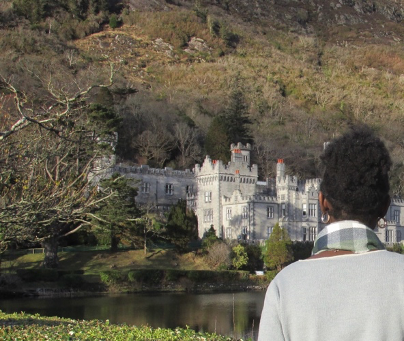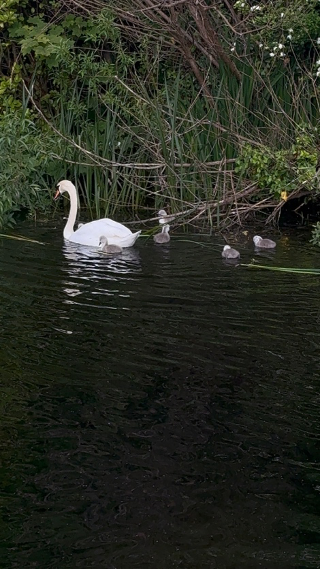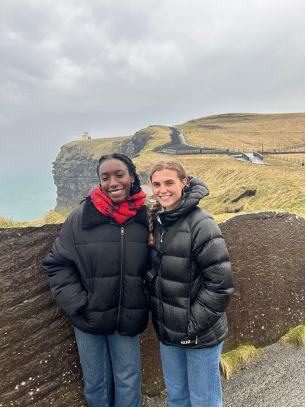by Jenny Ongele

When I first decided to study abroad, I had a clear image in my head of what that “should” encapsulate. I assumed studying abroad meant spending every waking moment travelling across Europe, taking the most aesthetic photos of all the architecture and natural scenery, while somehow, miraculously, transforming my entire identity. However, I found a lot of peace within Ireland, spending most of my time alone.
As someone who recently turned 21, that sounds incredibly boring. And for someone who’s entering the job force in just a year, it might sound a little unambitious or shiftless. But this shift in mindset was an indication of growth and adjustment to my new environment. At home in America, I’m devoted to the “grindset”. I, like many Wesleyan students, tend to overload my schedule with numerous clubs, jobs, and classes every semester. I have little to no “me-time,” because I’m trying everything in my power to become the “best version” of myself. But here, I’ve taken a monumental step back and I feel better than any version of myself with perfect grades, endless passion projects, and part-time jobs, or validation from others affirming that I was a hard worker. I’m redefining what growth looks abroad based on the standards and expectations of my environment. Taking a step back to focus on devotion to oneself and one’s surroundings, rather than just on discipline, helps one to stop to smell the roses. Living so intentionally exposes so many parts of your identity. I learned in just a few months that I define myself through my work and academics, and that’s how I shape all my goals and plans. My peers in Galway did not use their ability to excel academically or professionally to define themselves, and that might be better.

It was a journey to come to this realization and based on the unrealistic expectations I set whilst dreaming about adventuring through Greece “Mamma Mia” style, I felt like I was “failing” at studying abroad. Looking back, that’s an incredibly unfair outlook. I think the excitement of travelling to Europe kind of blinded me. I forgot that first and foremost, I’m here for schooling, so when I got assigned my first essay, reading, and group project, I was floored. I was trying to see if the hills are alive with the sound of music, not to study whether those hills are eroding due to climate change. How on Earth am I supposed to share compelling stories about my time abroad when I spend my day unpacking Althusser’s theories on ideological state apparatuses?
When you plan to study abroad, especially in programs that don’t offer employment, you have to be realistic and, for students with similar financial backgrounds as mine, reevaluate why you’re studying abroad. If it’s exclusively to reshape your Instagram feed, then all power to you. But also remember that going in with that goal, the trip likely won’t reach your expectations. Even if you have an endless supply of funds and resources, I doubt that the experience will feel as fulfilling because you’re still shackled by a fast-paced grindset with no time to soak in your surroundings. Everyone is different, but for me, this past month, I found that the key to immersing myself in a culture is simply through observation. And the best and most convenient part about living my “quiet life,” or seemingly lonely life, is I’m always observing other students, nature, friends, families, buildings, food, music, everything. When you don’t constantly have distractions or people to talk to, all you really can do is watch your surroundings, and it’s transformative. Every task, every bit of my routine, feels more intentional.

One thing I’ve gotten to focus on that changed my attitude toward studying abroad (and changed the trajectory of my semester): I get to observe myself. A quiet life forces you to do one thing and one thing only: to exist, whatever that might look like. And my peers in Galway embrace this mentality. The workload at my school was not too different from Wesleyan’s, but students had more time to work, to complete assignments, to simply focus on themselves. There’s a greater emphasis on work-life balance that challenged my existing beliefs on the most effective school environments. As a recovering perfectionist and mini workaholic, slowing down feels awful, like failure. Before the adjustment, any lull in time that wasn’t occupied by productivity felt insufferable. When studying abroad in cities as small as Galway, it’s easy to assume “there’s nothing to do here.” However, confronting this fear taught me how to cook, how to plan trips, and organize my time in a more meaningful fashion. Through these changes, I could find peace and joy in the seemingly mundane.
The circumstances didn’t change, but I did. All the latent changes in my identity were not by excelling at work, but by taking advantage of what my environment uniquely has to offer. And for me, that was falling asleep to rain, watching swans on my way to class, and having extra time to myself. I’m so lucky and so grateful that my time abroad let me romanticize a quiet life.


